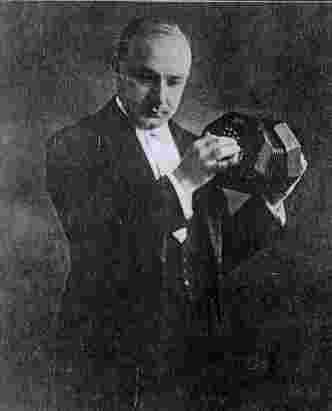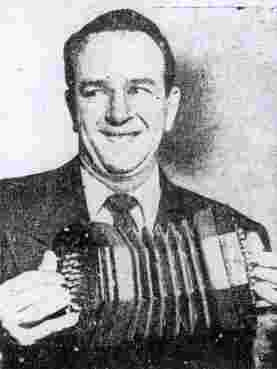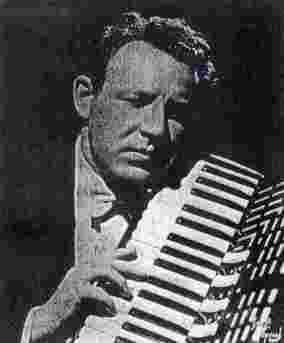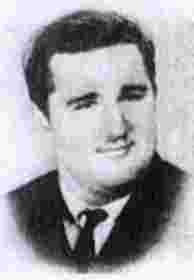Articles and Essays Featuring Classical Free-Reed Instruments and Performers
Eric Matusewitch
Seventy-five years ago, a unique musical family emigrated from Russia to the United States. Gregory Matusewitch, along with his sons Boris and Sergei, established a musical tradition on the classical concertina and accordion in the U.S. which continues to this day. Indeed, as one author has pointed-out, "the Matusewitch name is literally synonymous with the concertina in America." (Thomas Gabriel, "The Russian Virtuosi in America: An Interview with Sergei Matusewitch,"Concertina & Squeezebox, Issue No. 21, 1989, p. 4.)
 Gregory Matusewitch (nee Grigori Matusewicz) was born in 1886 in Minsk,
Russia. He was one of nine sons father by Hyman Matusewicz, owner of a
large house-furnishing shop in Belorussia.
Gregory Matusewitch (nee Grigori Matusewicz) was born in 1886 in Minsk,
Russia. He was one of nine sons father by Hyman Matusewicz, owner of a
large house-furnishing shop in Belorussia.
As a youngster, Gregory studied the violin with a private teacher in Minsk and was considered quite proficient on the instrument. One day, when Gregory was a teenager, an inebriated Tartar (known as Mulka the Tartar) appeared in Minsk, playing the concertina. Gregory was fascinated by the bellows instrument and bought the drunk a bottle of Vodka. The appreciative Tartar presented the young Minsker with the concertina. Gregory subsequently taught himself to play Wheatsone's invention; he never took lessons.
Gregory had a rich and varied musical career in Russia, Western Europe and the United States. As a young man he performed for the Czar's family, although never for the Czar, himself. In 1920, Gregory moved his family to Danzig, Germany, which was to be home for the next three years. While in the Free City, Gregory received a League of Nations Passport which allowed him to travel to other countries for six months, or for the life of his musical contracts. From 1920 through 1923, Gregory crossed the Atlantic several times to fulfill such obligations in the U.S.
Gregory concertized extensively in Germany during the 1920s. He frequently gave recitals in Danzig and Zoppot, a fashionable middle-European resort. In August 1922, Gregory was featured at the Alhambra Theatre in Prague, Czechoslovakia. A typical program consisted of works written for the violin--but played on the concertina--by Tchaikovsky, Sarasate, Mozart and Kreisler. Gregory also made several recordings for Deutsche Gramophon in Berlin and the Victor Talking Machine Company in Camden, New Jersey. On May 8, 1922 he recorded two selections for Victor and received the princely sum of forty-dollars! (Gregory's 1928 rendition of "Czardas" by V. Monti can be heard on The English Concertina, recorded and annotated by Richard Carlin, Folkway Records Album Number FW8845, 1976.)
In March 1922, Gregory appeared on an early American radio concert:
a Charles D.Isaacson Evening Mail "wireless" concert broadcast on
station WYCB. The March 8th edition of the
Evening Mail, a New York City daily, observed:
A distinct novelty on the programme will be the projecting for the first time by radio-phone of selections played on the concertina by the Russian virtuoso, Gregory Matusewicz. The artist has made a serious instrument of the little brother of the accordeon and those who listen in tonight will find that Mr. Matusewicz can get the tones of a violin or viola from the concertina. His command of the concertina enables him to play selections by Sarasate, Kreisler, Popper, Mozart and Tschakowsky [sic].
Gregory's American debut was widely acclaimed by the New York press. Musical America declared on February 26th:
Gregory gave his second New York City recital on November 15, 1924 at Aeolian Hall. On November 16th, the music critic for the New York American wrote that Matusewitch "played music by the best composers and played it with bewildering finish, insight and charm. He is a true artist. Henceforth my hat is off to the hithero despised concertina."
Gregory strongly identified with working people and played at a number of union functions. He was heard at a concert for the striking cloak makers of the International Ladies Garment Workers Union (ILGWU), Webster Hall, New York City, 1922; a May Day Celebration arranged by the Dressmaker's Union, Cooper Union, New York City, May 1, 1925; and at the Fifth Anniversary Amalgamated Tobacco Workers Grand Concert and Ball, Harlem Casino, New York City, April 24, 1926.
The Russian virtuoso also played the vaudeville circuit, appearing in the top theaters and night clubs even during the Depression years. In addition, he composed a piece for concertina or violin and piano, entitled "Oriental" (published by I. Press and G. Matusewitch, 1928).
Gregory Matusewitch died on July 28, 1939 in New York City at the age of fifty-three. He had a relatively brief, but extremely rich and varied musical career.
 Boris Matusewitch, Gregory's youngest son, also had an active and successful
musical career on the English concertina. He was born on November 6, 1918
in Minsk, Russia and received his musical training from his father. Boris
and brother Sergei (an accordionist) first appeared in public on April
26, 1935. They performed duets at a concert given by Gregory at the Sholom
Aleichem Co-Operative in New York City.
Boris Matusewitch, Gregory's youngest son, also had an active and successful
musical career on the English concertina. He was born on November 6, 1918
in Minsk, Russia and received his musical training from his father. Boris
and brother Sergei (an accordionist) first appeared in public on April
26, 1935. They performed duets at a concert given by Gregory at the Sholom
Aleichem Co-Operative in New York City.
The Matusewitch brothers gave their first joint recital on May 5, 1939 at the Rand Music School Auditorium in New York City. The Accordion World wrote: "The appreciation with which these two artists were regarded left no doubt that they were indeed masters of their favorite instruments, and doing much to make them popular" (June 1939, p. 20). In 1940, the Matusewitch brothers performed at the McDowell Club in Manhattan and were heard on a series of WQXR radio broadcasts.
During the same year, Boris had engagements at the Waldorf Astoria and Biltmore hotels. On December 22, 1940, he soloed with the New York Mandolin Symphony Orchestra, playing Rimsky-Korsakoff's "Fantasy on Russian Themes," originally scored for violin and orchestra.
Just prior to World War II, Boris settled on the West Coast, where he was featured at the Jonathan Club in Los Angeles and dubbed "The Monarch of Concertina Melody." In 1942 he made appearances at the Huntington Hotel (Pasadena, California), the Sir Francis Drake Hotel (San Francisco), the Clover Club (Portland, Oregon), the Town Ranch (Seattle, Washington), and the Cave Supper Club (Vancouver, British Columbia). A Canadian newspaper found that "Boris is an accomplished concertina artist with a technique refreshingly different from that of the average instrumentalist."
In 1943 Uncle Sam invited Boris to join World War II. The concertinist was assigned to the Special Services Training Center at Camp Sibert, Alabama. There, he joined forces with other entertainers, such as dancer Ray Malone and band-leader Bill Finnegan, and performed for the G.I's in the States and Pacific Islands. Private Howard Taubman, later chief music critic of the New York Times, heard Boris play and referred to him as "a virtuoso of the concertina." ("No Amateurs, These GI Joes," New York Times, June 18, 1944). Taubman also fondly remembered Boris in his memoirs. He wrote that "Boris played the concertina brilliantly, and his repertoire was enormous." (The Pleasure of Their Company: A Reminiscence, Amadeus Press, 1994, p. 134.)
In July 1943 and 1944, Boris was selected to appear on the popular Major Bowes radio broadcasts from New York City. On January 24, 1948, Boris and Sergei resumed their joint activities at Times Hall, New York City. The New York Times music critic raved:
- Boris Matusewitch, concertinist, and his brother Sergei, accordionist,
gave a joint recital in Times Hall last night before a good sized and
highly enthusiastic audience. The program was devoted almost
entirely to the repertoire of concert pianists and violinists in transcription,
and included the first performance of "Two Preludes" dedicated
to Boris
by Robert S. Lissauer...The concertina is a melodic instrument, of
haunting
quality, capable of delicate inflection, nuance and even vibrato. Boris
played
it as if it were a violin, giving his selections musical meaning as
he swung
his instrument before him. His rendition of Mr. Lissauer's works had
charm and melody, and the composer added his applause to that of the
audience. (January 25, 1948)
During the 1960s and 1970s, Boris and Sergei gave annual recitals at Carnegie Recital Hall, the New York City Historical Society and the Lincoln Center Library and Museum of the Performing Arts. On several occasions, they were joined by sons Eric (an amateur concertinist) and Marc (an amateur pianist). Additionally, Boris and Sergei regularly performed with the Balalaika Symphonic Orchestra, playing concerti by Bach and Vivaldi on two concertinas. On May 12, 1968, they soloed with the Hudson Symphony Orchestra of New Jersey.
Boris, a versatile musician and performer, participated in several Broadway theatrical productions. He played the concertina in the following shows: "Wisteria Trees" (featuring Helen Hayes), "The Wall" (starring George C. Scott), and "Fanny" (led by Ezio Pinza and Florence Henderson). Boris' wife and concertina student, Norma Pollen Matusewitch, substituted for him when Boris had other engagements.
On June 11, 1970, Boris appeared in a New York Philharmonic International Promenade concert. The concertinist supplied the music for a ballet choreographed by Edward Villela ("Off to Sea Once More"). Harriet Johnson of the New York Post took note of Boris' nautical stage costume: "Boris Matusewitch, a sea-hippie, was there with his concertina to add sights and sounds to life on deck and in port." (June 12, 1970, p. 49) In the 1970s, Boris organized a concertina quartet, composed of himself and three of his students. The Boris Matusewitch Quartet's 1975 rendition of Scott Joplin's "Chrysanthemum" can be heard on The English Concertina, recorded and annotated by Richard Carlin, Folkway Records Album Number FW8845 (1976).
Boris taught hundreds of students during his forty year career, including actors George C. Scott and Shelly Winters. Author Alexander Rose penned this account in his autobiography: "Heard a concertina player in a night club and rushed to Matusewitch, the famous concertina artist, next day for lessons." (Memoirs of a Heterosexual, Simon and Schuster, 1967, p. 284). Another student of Boris Matusewitch, Allan Atlas, performed on the concertina and accordion during the 1950s and 1960s. Dr. Atlas is now chairman of the music department at the Graduate Center of the City University of New York and author of a history of the instrument, The Wheatstone English Concertina in Victorian England (Oxford University Press, 1996). That book is graciously dedicated to Boris and Sergei Matusewitch. Boris, along with his brother, also wrote a "tutor" for the instrument, The Gregory-Matusewitch Method for the English Concertina (n.d.), which is available in the Library of Congess (call number MT681.M38).
Boris died on August 5, 1978 at age 59.
 Sergei Matusewitch has been a leading exponent and virtuoso of the classical
accordion for the past sixty years. During his unique musical career, Sergei
has soloed with orchestras; given joint recitals with brother Boris; written
three compositions for accordion ("Artiste Fantasie," "Capriccioso"
and "Etude in D Minor"); taught many students; and made several accordion/concertina
recordings. His last recording ("Classical Accordion-Concertina Recital,"
S-M Records, 1981) was reviewed by the Express-News of San Antonio
Texas. The music critic for that paper wrote that "while we're on the subject
of good music on unexpected instruments, this album is a definite standout.
Matusewitch is one of the world's leading classical accordionists. On this
LP, he serves up an impressive recital [including] works by Brahms and
Frosini." During the 1940s, Sergei was featured several times on the cover
of the instrument's major journal, Accordion World. At age 80, Sergei
continues to perform periodically and teach accordion and concertina in
New York City.
Sergei Matusewitch has been a leading exponent and virtuoso of the classical
accordion for the past sixty years. During his unique musical career, Sergei
has soloed with orchestras; given joint recitals with brother Boris; written
three compositions for accordion ("Artiste Fantasie," "Capriccioso"
and "Etude in D Minor"); taught many students; and made several accordion/concertina
recordings. His last recording ("Classical Accordion-Concertina Recital,"
S-M Records, 1981) was reviewed by the Express-News of San Antonio
Texas. The music critic for that paper wrote that "while we're on the subject
of good music on unexpected instruments, this album is a definite standout.
Matusewitch is one of the world's leading classical accordionists. On this
LP, he serves up an impressive recital [including] works by Brahms and
Frosini." During the 1940s, Sergei was featured several times on the cover
of the instrument's major journal, Accordion World. At age 80, Sergei
continues to perform periodically and teach accordion and concertina in
New York City.
When not playing the concertina, Eric Matusewitch is an Equal Employment
Opportunity Specialist for the New York City Equal Employment Practices
Commission. He was written numerous articles on employment discrimination
law for national, legal and paralegal publications and given lectures on
that topic for schools and organizations in New York, New Jersey,
Pennsylvania and Maryland. His educational credentials include Masters
Degrees in Political Science and Library Science and a Certificate in
Paralegal Studies. He can be reached via e-mail at ematuse@aol.com.
Note: This essay (written in November 1997) is an expanded and
updated version of two published articles written by Eric Matusewitch
("Gregory Matusewitch," Mugwumps, August/September 1983, pp.
10-11 and "Boris Gregory Matusewitch," Mugwumps, June 1983, pp.
14-15).

Eric Matusewitch (the son and student of Boris Matusewitch) performs on
the concertina in New York City. He has performed at the New York City
Historical Society, Carnegie Recital Hall, and the Brooklyn Conservatory
of Music.
Invitation to Contributors / Submission
Guidelines Back to The Free-Reed Journal
Contents Page Back to The Classical Free-Reed,
Inc. Home Page